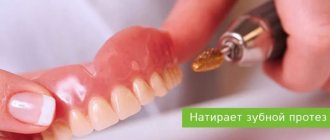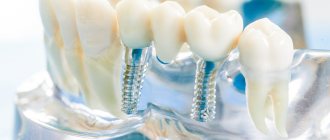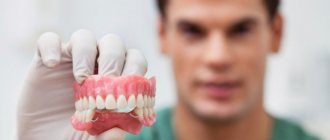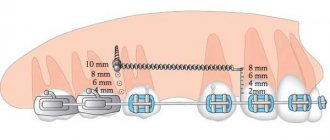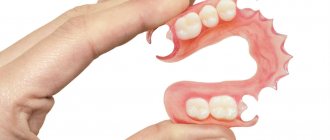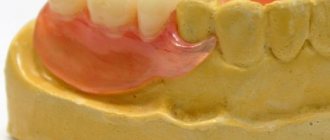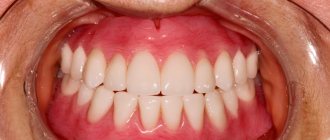Removable dentures are represented by structures that are fixed on the gums not with glue, but with the help of special clasps. Such dentures are made when the patient has lost one tooth unit or, most often, several. Most of the current designs are made from modern acrylic plastic. This material is durable and retains both color and shape for a long time.
Do I need to remove dentures at night?
Why it may be necessary to remove a prosthesis
If we discuss modern prostheses, then it is not at all necessary to take them off every night. Orthopedists recommend removing them if you feel a burning sensation on the mucous membranes or dryness in the oral cavity. It also happens that a rash appears on the body. But these cases are rare and allergic in nature. If it occurs, you need to go to the doctor to eliminate the causes of this pathological situation.
You don't have to take your dentures off every night
Another point why a patient may need to remove dentures at night is his own fears. A certain percentage of people are quite suspicious of their own health and the manipulations that doctors perform with it. Removable dentures are an innovation in their lifestyle, they need to get used to them, realize that they now replace missing teeth. A person may be afraid that the prosthesis will fall out of place in a dream, that it could be injured. Some prosthetic owners even worry that they will be able to swallow a small prosthesis (although this is very problematic).
The orthopedist will explain to the patient how to care for the prosthesis and how to store it.
Of course, a doctor can dispel such fears. If the patient trusts his orthopedist, and he, in turn, explained to the person everything about the use of prostheses, worries will disappear on their own. But if the person himself decides that it is safer for him to remove the prosthesis at night, then he may well do so.
Interesting things about prosthetics:
REMOVABLE PROSTHETICS
Types, pros, cons
From 25,000 rub.
FIXED PROSTHETICS
Types, pros, cons
From 45,000 rub.
Repair and correction of removable dentures
Restoration methods
From 2,000 rub.
Crowns
How to store dentures at night
Previous rubber prostheses, which were used before modern acrylic structures, had to be removed every night. And they left them overnight in a regular glass of water. Today, with prosthetics, things are a little different. Only at the initial stage of construction a humid environment is required, no more than one and a half months. Acrylic plastic takes on its best appearance when exposed to air, which is explained by the passage of monomers.
The logic is simple: the human mouth already has a humid environment, which means that dentures can be worn in the mouth, removing them only occasionally. And they need to be stored not in glasses, but in convenient containers. In some cases, dentures may be wrapped in cotton cloth.
Container for dentures
If you are going to take out your dentures before going to bed, you need to follow simple instructions.
- Acrylic dentures
How to properly remove dentures at night:
- the structures are removed and washed thoroughly with boiled water (but not running!);
- The prosthesis can be cleaned with a special liquid with an antiseptic effect, as well as with a brush;
- place the structure in a special solution: this composition destroys bacteria that have accumulated during the day, and also removes the remnants of the fixing cream.
Korega tablets for cleaning dentures
About once a year, dentures should be professionally cleaned at a dental clinic. Immediately after installing the structure, ask the doctor how to properly clean them, where to get the composition and storage container, and how often to come for preventive appointments. The doctor is obliged to provide you with comprehensive information.
Video: Should I take my dentures off at night?
Removable dental prosthetics in Krasnoyarsk
At Mira Clinic we install all types of prostheses, each of them can be made of different materials. Choosing a prosthesis involves a thorough diagnosis, detailed consultation with the patient and the appointment of optimal prosthetics. Each case is individual: when choosing a prosthesis for a patient, the doctor takes into account health characteristics, the structure of the dentition, the absence of one or more teeth, bite and other nuances.
Most often, removable dental prosthetics in Krasnoyarsk are used in cases of complete absence of teeth. It must be said that in this situation, implantation is also possible, but in rare cases it is contraindicated, as is the installation of permanent structures. Dentures that can be removed are cheaper. This tooth replacement can be either temporary or permanent, but you should be aware that after about 10 years the dentures will need to be updated.
In addition to replacing one or both jaws, a denture can replace just one tooth. This is called a “butterfly prosthesis”, we will look at it further.
Consequences of insufficient denture care
Dental removable structures require constant care. If you neglect it, you can face a whole list of problems. Therefore, from the very first day of using dentures, you need to follow the rules of care.
Possible consequences of insufficient denture care:
- repulsive odor emanating from dentures;
- carious destruction of native teeth;
- ulcers and erosions on the mucous membrane;
- inflammatory process on the gums;
- change in taste sensations for the worse;
- aesthetic defects of removable structures.
Dentures require mandatory cleaning and care
You should definitely seek help from specialists so that they can return your dentures to their previous appearance with professional cleaning. This will extend the life of the dentures. As a rule, all modern clinics carry out such cleaning.
Cleaning the prosthesis
How to care at home
The products used to clean your home can achieve good results. The most important thing is to regularly care for your dentures at home. But professional cleaning should be an equally significant addition to home care.
When cleaning them at home you need to use:
- with a soft toothbrush (carefully treat areas of contact with the gums);
- non-abrasive toothpaste (you can use gentle children's toothpaste);
- tablets - indicators of bacterial plaque;
- disinfectant solutions (antiseptics, rinses containing chlorhexidine, special tablets).
Treatments using vinegar or lemon are especially popular. Frequent cleaning with vinegar is not advisable, as it negatively affects the strength of the teeth. You can use this method sometimes by placing the structure in vinegar for 2 hours.
It is safer to mix a quarter of a lemon with toothpaste or powder and apply the mixture and leave for 20 minutes. Then rinse with running water. Some people try to use baking soda, but doctors say there are no results from such cleansing, despite the prevailing opinion about its effectiveness.
How to get used to dentures faster
The problem of leaving the denture overnight or removing it usually occurs among those who are not fully accustomed to such teeth. At the same time, the person himself must show some effort; addiction requires the involvement of the owner of the prosthesis in this adaptation period.
How to get used to removable dentures
| Adaptation measures | How often to do | Notes |
| Reading aloud | At least three to four times a day for at least five minutes. | At the same time, you need to read expressively and measuredly so that the articulatory apparatus gets used to the new teeth. |
| Wear the design constantly | The dentures do not need to be removed at all for at least 4-5 days. | This is a mandatory measure - the key to successful addiction. |
| Optimal chewing load | An ordinary apple will help: cut it into pieces, chew gradually. Eat one or two apples a day this way. | Listen to your feelings; if the discomfort is severe, you should go to the doctor. |
| Regular cleaning | You need to clean your denture twice a day, morning and evening. | After every meal, rinse your mouth. |
- Clasp dentures
Although not often, it happens that at first a new design can cause vomiting. There is no need to panic and remove the prosthesis: breathe deeply, drink plenty of fluids. Sucking mints will help relieve the urge.
Possible problems and methods for solving them
Regardless of how removable dentures are attached and what material they are made of, the vast majority of patients face some problems characteristic of the adaptation period. Let's list the most common ones among them.
Excessive salivation
The increased production of saliva is explained by the fact that the body perceives any object that ends up in the oral cavity as food, and therefore begins to produce saliva to process it. The problem is relevant only in the first days, then everything returns to normal, but even in a short time it can become a source of trouble.
The way out of the situation is salt rinsing, which helps reduce the amount of saliva in the mouth. They will require a solution of 100 milliliters of water and half a teaspoon of salt. The effect of this rinse lasts for an hour, after which the procedure is repeated.
In the first days of wearing a prosthesis, your gums may hurt - this is a normal reaction to the prosthesis.
Pain in gums while wearing
Pain can appear both due to poor-quality manufacturing of the prosthesis, and as a natural reaction of the body to the appearance of a foreign body. In the second case, you can deal with it yourself. The following will help reduce pain:
- Rinse with soothing herbal infusions.
- Using medicinal oils of sea buckthorn or rosehip in the form of applications.
- Refusal of hard foods.
- Self-massage of gums.
If the pain does not go away, ulcers and chafing occur - probably the reason is poor manufacturing and improper placement of the structure. In this case, only a doctor can correct the situation by relining and adjusting the prosthesis.
If discomfort persists, consult a doctor as the denture may need to be relined.
Feeling of dry mouth
Dry mouth is a normal physiological reaction of the body to dentures. After complete adaptation, it will disappear; to speed up the process, it is recommended to drink more and always carry a bottle of water with you.
If the situation does not change within 1-2 weeks, especially if itching and burning are added, you should consult a doctor, since these symptoms may indicate the development of candidiasis.
Rubbing gums
At first, rubbing occurs frequently: over the course of 1-2 months, a prosthetic bed is formed, and the mucous membrane adapts to the foreign structure. The more precisely the product is made, the better it fits to the gums, the lower the likelihood of chafing. If they do occur, the following measures will help:
- The use of medicinal ointments (oxolinic, nystatin, acyclovir and others) and gels (Cholisal, Kamistad, Asepta).
- Correction of the shape of the prosthesis if it does not correspond to the soft tissues. Excess areas of the structure are determined by the imprints left on the gums and are removed with a milling cutter, after which final grinding is carried out.
- Replacement of a product indicated when it is deformed, shrinks, or an allergic reaction occurs.
To reduce discomfort during the period of getting used to the prosthesis, use special gels and ointments
The prosthesis causes vomiting
The gag reflex is caused by the sensitivity of the soft palate, which is a protective reaction of the body. During prosthetics, the tighter the product adheres to the mucosa, the less it appears. If the fit is incomplete, the patient may feel nauseated, so the main task is the most accurate work of the orthopedist and dental technician.
To get rid of nausea, it is recommended to drink hot tea with lemon and suck on mint candies. Another way is to distract yourself from your own feelings by doing something that requires concentration. If nausea does not go away, it makes sense to undergo an examination, since an increased gag reflex can be a manifestation of some chronic diseases (for example, helminthic infestation).
Impaired diction
Sound production is impaired, since the free space in the oral cavity becomes less with the advent of the prosthesis. At the top it covers part of the palate, and at the bottom it covers the sublingual space. Speech restoration occurs much faster if the design provides for the absence of an artificial palate.
To restore diction, it is necessary to perform special speech therapy exercises, which will be taught by an orthopedist. Other ways are regular reading aloud (for 15-20 minutes), saying tongue twisters.
To restore diction during the adjustment period, perform special exercises
Chewing problems
The ability to chew food normally is not restored immediately, but it will return faster if you put in some effort:
- Chew on both sides. This way the load will be distributed evenly and the structure will not move.
- You should not bite food with your front teeth: the risk of the structure shifting increases.
- At first, it is necessary to give preference to soft foods, eating them in small portions and chewing them slowly.
- Doctors recommend using special means for fixation to prevent food particles from getting under the artificial base.
- There is no need to eat hard foods or those containing small particles (for example, berries with small seeds).
Changing tastes
The decrease in the sensitivity of taste buds is explained by the fact that they are covered by a plastic or nylon base. Lack of taste in food leads to decreased appetite, deterioration of mood, and this can lead to problems in the functioning of the gastrointestinal tract.
Dentures that cover the roof of your mouth can affect your taste buds and dull your sense of taste.
In order for the sensations to return, it is necessary to spend more time chewing each piece of food, giving preference to a soft consistency. Over time, receptors adapt to new conditions.
How common is denture intolerance?
There is a small percentage of patients who still cannot get used to removable structures. If the person himself follows all the instructions for successful adaptation, but the discomfort does not go away, this indicates intolerance to the prostheses. Usually, in this case, the prosthesis gets in the way, is perceived as a hindrance in the mouth, rubs the gums, spoils pronunciation, and makes it impossible to eat without feeling uncomfortable.
Sometimes intolerance to dentures occurs
Oddly enough, the dentist is a bad helper in such a situation. In most such cases, we are talking about psychological intolerance. Some internal attitudes prevent a person from accepting a prosthesis. It is logical to assume that you need to see a psychologist. This practice exists, and it is quite successful.
Storage of removable dentures
The design of the products provides that they can and even need to be removed periodically. Consider a number of rules on how to do everything and where to store orthodontic structures:
- removal of contaminants. Before storing dentures, they must be cleaned of food debris, plaque, and microbes. To do this, use toothpaste, a brush and running water for rinsing;
- rubdown Speaking about how to properly store dentures, it should be noted that this is done if the structures are dry. Modern products are made from materials that cannot be left in a liquid environment for a long time;
- ensuring optimal humidity levels. It should be no more than 40–70%;
- protection from exposure to sunlight;
- protection from chemicals and vibrating devices. They can cause harm to structures (change their color, reduce their ability to securely fix, cause deformation).
Proper storage of dentures requires that a safe place be chosen. It is undesirable if children and pets have access to it, as they can harm themselves with the products or break them. Handling the orthodontic structure must be careful and careful. It should not be allowed to fall or have any object fall on it. It is necessary to provide protection from any mechanical impacts and shaking.
Currently, special containers are produced for storage. They are worth using because it is convenient and safe.
How to reduce pain symptoms when wearing a prosthesis
At first, a person may feel some pain while chewing. This is explained by the unusual load; over time, such sensations should go away. The gums, a certain area of which was without teeth for some time, “forgot” this condition with a full row of teeth, so it can be uncomfortable. Some patients say that they feel as if the denture is pressing on their gums.
Some patients claim that the denture puts pressure on the gums
To remove these negative feelings, give up solid food for the first month - food should be as soft and comfortable as possible. Solid foods are allowed only as you get used to the dentures.
You will have to give up solid food for a while
It is necessary to monitor the condition of the mucous membrane: any damage, even the slightest, should be prevented. They are fraught with an inflammatory process that will interfere with the use of prostheses. Prolonged pain during the use of prostheses is explained by only two reasons: hypersensitivity of the patient’s mucous membrane or an incorrectly made prosthesis, the size of which did not suit the patient.
It is important to observe the mucous membrane, noting the appearance of discomfort, pain
To ease the condition of your gums in the first days of adaptation, you can do self-massage. Using fingers treated with an antiseptic, you need to stroke the gum itself in a circular motion. There is only one movement - from the healthy gum area to the inflamed side. When the stroking becomes as comfortable as possible, the pressure can be increased.
Gum massage
Adaptation to prostheses is the work of the patient, his own efforts. Follow all instructions, do not remove the prosthesis too often, remember that you can sleep in it without any precautions. Read about rinsing after tooth extraction for gum healing on our website.
Injuries
In the first days after installation, injured areas may appear on the surface of the gums: small wounds, abrasions, etc. They may appear due to improper chewing technique or sensitivity of the mucous membrane. Normally, the denture stops rubbing the gums within a few days. You can speed up this process by rinsing with antiseptic solutions and chamomile decoction.
If injuries do not go away over time, become more pronounced, or cause increasing discomfort, you should consult a doctor. The problem may lie in the design itself. The doctor will conduct an examination and correct the prosthesis. Usually one correction is enough for the discomfort to go away.
